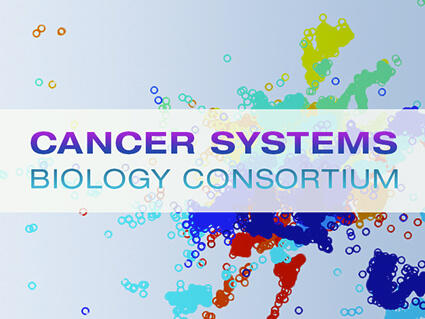Impact of Cancer Systems Biology Research
There has been an explosion in the quantity of available experimental data from high-throughput and single-cell technologies, such as genomic sequencing, transcriptomics, metabolomics, and proteomics. Additionally, targeted experiments on a smaller scale focused on a small number of genes and proteins have provided important information about complex interactions within and between cells. Systems analyses and predictive modeling are necessary to integrate across these datasets that span different length and time scales to convert them into actionable knowledge.
DCB has supported development and growth of the cancer systems biology field since 2004. The Cancer Systems Biology Consortium (CSBC), DCB’s most recent effort to support cancer systems biology research, has three main goals:
- Advance our understanding of mechanisms that underlie fundamental processes in cancer
- Support the broad application of systems biology approaches in cancer research
- Support the growth of a strong, stable, and diverse research community in cancer systems biology
An external expert panel evaluated the progress towards accomplishment of these goals in 2020. The panel found that CSBC investigators were contributing significant tools and knowledge towards our understanding of the tumor microenvironment, mechanisms of drug resistance and sensitivity, and cancer metastasis. A summary of CSBC progress and data describing the impact of the CSBC are publicly available, as is the external expert panel report.
It is envisioned that the success of cancer systems biology will encourage investigators to bring a systems biology approach to bear on emerging and difficult cancer questions that will require a systems approach to fully comprehend.
CSBC News
Dr. Sarah Groves, the Education Scholar for SASCO CSBC Center, created a video about the importance of systems biology for cancer research. It answers the following questions:
- WHAT is systems biology?
- WHY do we need systems approaches in cancer?
- HOW do systems approaches get used in the clinic today?
CSBC Resources for Researchers
The Cancer Complexity Knowledge Portal contains the latest available resources generated through the CSBC. Information in the database includes:
- Grants
- Investigators
- Publications
- Datasets
- Tools
CSBC Associate Membership
The CSBC offers the opportunity for Associate Membership in the consortium to those who are not currently funded through a CSBC award. Additional information, including eligibility criteria, expectations of associate members, and the application form can be found on the CSBC Associate Membership webpage.
Contacts for the CSBC
For additional information about the CSBC, please contact Dr. Hannah Dueck or Dr. Monica Zamisch.
Funded Projects
Research Centers for Cancer Systems Biology (U54s)
Research Projects in Cancer Systems Biology (U01s)
Multi-Consortia Coordinating Center (U24)
| Institution | Principal Investigator(s) | Center Title |
|---|---|---|
| Sage Bionetworks | Susheel Varma, Jineta Banerjee | Multi-Consortia Coordinating Center (MC2 Center) for Cancer Biology: Building Interdisciplinary Scientific Communities, Coordinating Impactful Resource Sharing, and Advancing Cancer Research |
Past Projects
Research Centers for Cancer Systems Biology (U54s)
| Institution | Principal Investigator(s) | Center Title |
|---|---|---|
| Arizona State University | Carlo Maley, Darryl K. Shibata | Arizona Cancer and Evolution Center (ACE) |
| City of Hope | Andrea H. Bild | Combating Subclonal Evolution of Resistant Cancer Phenotypes |
| Columbia University | Andrea Califano, Barry H. Honig | Centers for Cancer Systems Therapeutics (CaST) |
| Harvard Medical School | Peter K. Sorger | Systems Pharmacology of Therapeutic and Adverse Responses to Immune Checkpoint and Small Molecule Drugs |
| Massachusetts Institute of Technology | Scott R. Manalis, Douglas A. Lauffenburger | Quantitative and Functional Characterization of Therapeutic Resistance in Cancer |
| Memorial Sloan Kettering Cancer Center | Christina S. Leslie, Alexander Y. Rudensky | The CSBC Research Center for Cancer Systems Immunology at MSKCC |
| Oregon Health & Science University | Laura M. Heiser, Emek Demir, Gordon B. Mills, Rosalie C. Sears, Claire J. Tomlin | Measuring, Modeling and Controlling Heterogeneity |
| University of California, Irvine | John Lowengrub, Arthur D. Lander, Marian L. Waterman | Complexity, Cooperation and Community in Cancer |
| University of California, San Francisco | Nevan Krogan, Trey Ideker | Research Center for Cancer Systems Biology: Cancer Cell Map Initiative |
| University of Texas Health Science Center at San Antonio | Tim H.M. Huang, Victor Jin, Qianben Wang | Systems Analysis of Epigenomic Architecture in Cancer Progression |
| Vanderbilt University | Vito Quaranta | Phenotype Heterogeneity and Dynamics in SCLC |
| Yale University | Andre Levchenko | Systems Analysis of Phenotypic Switch in Control of Cancer Invasion |
Research Projects in Cancer Systems Biology (U01s)
Coordinating Center for the CSBC (U24)
| Institution | Principal Investigator(s) | Center Title |
|---|---|---|
| Sage Bionetworks | Julie Bletz | Coordination Center for Open Collaboration in Systems Biology |
